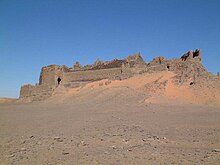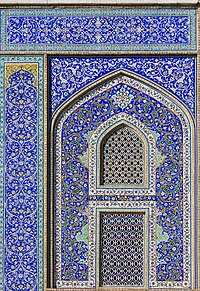Ksar
 From Wikipedia the free encyclopedia
From Wikipedia the free encyclopedia

Ksar or qṣar (Arabic: قصر, romanized: qṣar), in plural ksour or qsour (Arabic: قصور, romanized: qṣur), is a type of fortified village in North Africa, usually found in the regions predominantly or traditionally inhabited by Berbers (Amazigh).[1][2] The equivalent Berber term used is ighrem (singular) or igherman (plural).[1]
Etymology
[edit]The Arabic qaṣr (قَصَر) was probably borrowed from the Latin word castrum.[3][1]
Architecture
[edit]

Ksour in the Maghreb typically consist of attached houses, often having a fortified communal granary like those in Algeria, or the ghorfa and agadir types known in Tunisia and Morocco respectively, beside other structures like a mosque, hammam, oven, and shops. Ksur or igherman are widespread among the oasis populations of North Africa. Ksars are sometimes situated in mountain locations to make defense easier; they often are entirely within a single, continuous wall. The building material of the entire structure usually is adobe, or cut stone and adobe. The idea of the ksar as a granary is a confused notion of two things: the granary itself, found within a ksar, and the ksar, a village, typically with granaries within it. Ksars form one of the main manifestations of Berber architecture.
See also
[edit]References
[edit]- ^ a b c Van Staëvel, J.-P. (2004). "Ḳaṣr". In Bearman, P. J.; Bianquis, Th.; Bosworth, C. E.; van Donzel, E. & Heinrichs, W. P. (eds.). The Encyclopaedia of Islam, Second Edition. Volume XII: Supplement. Leiden: E. J. Brill. ISBN 978-90-04-13974-9.
- ^ Golvin, Lucien (1989). "Architecture berbère". Encyclopédie berbère. Retrieved 11 September 2023.
- ^ Wehr, Hans; Cowan, J. M. A Dictionary of Modern Written Arabic (Third ed.). Ithaca, N.Y.: Spoken Language Services. p. 768.
- ^ Binous, Jamila; Baklouti, Naceur; Ben Tanfous, Aziza; Bouteraa, Kadri; Rammah, Mourad; Zouari, Ali (2010). "X.6 Chénini (of Tataouine)". Ifriqiya: Thirteen Centuries of Art and Architecture in Tunisia. Islamic Art in the Mediterranean (2nd ed.). Museum With No Frontiers & Ministry of Culture, the National Institute of Heritage, Tunis. p. 269. ISBN 9783902782199.
External links
[edit]- www.ksour-tunisiens.com – complete documentation of all ksour of southern Tunisia, Herbert Popp & Abdelfettah Kassah
